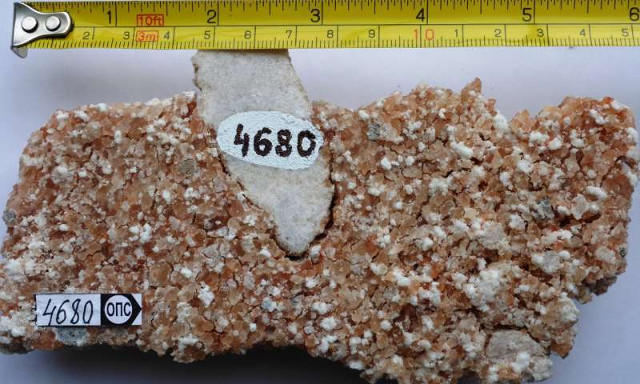Sea salt rock 2 billion years old shows an increase in oxygen in the ancient atmosphere
A 2 billion year old sea salt rock provides new evidence for transforming the Earth's atmosphere into an oxidizing environment capable of supporting ancient life.
A study by a group of international organizations including Princeton University found that an increase in oxygen occurred about 2.3 billion years ago, known as Great Oxidation Event - significantly larger, larger oxidation events. compared to similar events that have happened before.
Evidence shows that markedly increased oxidation is the crystalline salt stones found from a 1.2-mile deep pit in the Karelia region in northwestern Russia. These salt crystals were left behind when ancient seawater evaporated, and they gave geologists unprecedented evidence of the composition of oceans and atmospheres on Earth more than 2 billion years ago.

The important sign of the increase in oxygen comes from the discovery of minerals containing a large amount of seawater components called sulfates, which are produced when sulfur reacts with oxygen.
Aivo Lepland, a researcher at the Norwegian Geological Survey, a geological expert at Tallinn University of Technology and a senior author of the study, said: "These precipitators are the strongest evidence for Seeing that ancient seawater has a high sulfate concentration, according to our estimates, it reaches at least 30% of today's ocean sulfate content. "
Oxygen accounts for about 20% of the air and is an essential element for life as we know it. According to geological evidence, oxygen began to appear in the earth's atmosphere 2.4 to 2.3 billion years ago.
However, until this new study, geologists were not sure whether this accumulation of oxygen was due to the development of photosynthetic cyanobacteria, taking carbon dioxide and releasing oxygen. - is a slow event happening millions of years or earlier or not.
"It is difficult to test these theories because we have no evidence from that era to study the composition of the atmosphere," Blättler said.
The recently discovered salt rock crystals provide evidence to test this theory. Salt crystals obtained in Russia are a billion years older than any previously discovered salt deposits. Sediments contain halite, called rock salt and chemically it is identical to table salt or sodium chloride, as well as other calcium, magnesium and potassium salts.
Usually these minerals dissolve easily and will wash away over time, but in this case they are especially well protected deep in the ground. Geologists from the Norwegian Geological Survey, in collaboration with the Karelian Research Center in Petrozavodsk, Russia, recalled salt from the Onega Parametric Hole (OPH) drilling site on the western shore of Lake Onega.
John Higgins, assistant professor of geological sciences at Princeton, who provided an explanation of geochemical analysis with other co-authors, said the unique qualities of this salt rock specimen are very valuable. treatment in combining investigations, studies of what happened after the biggest oxidation event of that time.
This study will foster the development of new models to explain what happened after a major oxidation event caused an accumulation of oxygen in the atmosphere, Blättler said. "There may have been important changes in the atmospheric metabolism on land or in the oceans, or the increase in oxygen produced by bacteria, but in any case this amount is abundant. more than we thought. '